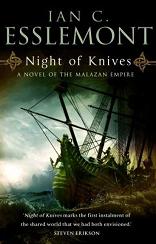
Night of Knives
Ian C. Esslemont
284 pages
published in 2005
I'm always wary of books set in another writer's world. Normally therefore I would've skipped this book, as it's set in Steven Erikson's Malazan universe. But as it turns out this isn't a book by a new writer using an established colleague's world to make a name for himself, as Ian Esslemont was in at the creation of Malazan from the start. Erikson and Esslemont had first met in 1982 on an archeological ditch and recognising kindred spirits, set out to create their own fantasy world. Scroll down roughly two decades and Erikson is the first to get his part of the world published with Gardens of the Moon, but it was always the idea that Esslemont would follow. As Erikson says in the introduction, this is not fan fiction, but Esslemont's part of the enterprise. Malazan is too big an universe for one writer, but two?
Night of Knives fills in the backstory to some of the plot twists not explained in Erikson's novels, but nobody will mistake it for his own work. It missed the widescreen, epic feel of the Erikson books, being set in a single place during a single day and night. Night of Knives also misses the deep layer of allusion, hint and complexity Erikson loads on to his epics. It's much easier to follow and much more straight forward; it might make a good starting point for people curious about Malazan.
The story's set on the island of Malaz itself, which gave the Malazan empire its name but has since become a bit of a backwater. This night however things are different, as this will be a night of Shadow Moon, when the magic Warrens touch the world directly and anything can happen. Various powers are gathering on the island in preperation for the night, as this is also rumoured to be the night emperor Kellanved will attempt to return to his throne. Because of this Surly, the current ruler of the Malazan Empire secret agents, the widely feared Claws are inflitrating the island, as are Shadow cultists. But of course, nothing is that simple in Malazan and the supposed return of Kellanved is much more than just a political struggle...
Caught in the middle is Temper, a sodden veteran with a secret past, who has sought out Malaz island as a place to quietly retire but is grudgingly dragged into the thick of it out of worry for Corrinn, a fellow veteran he has developed romantic feelings for, and who turns out to be an ex-Bridgeburner cadre mage and part of one of the factions fighting it out during the Shadow Moon. Who he is and where he learned to fight are shown through flashbacks, which makes a refreshing change from Erikson's habit of throwing the reading in at the deep end...
Then there's Kiska, a young woman with some largely unrealised talent for magic who longs to be taken into imperial service as a spy, whose curiosity about the odd courier ship turning into Malaz island on the day of the Shadow Moon drags her into the powerstruggle as well. It soon turns out the high Malazan offcial she's shadowing is much more than a courier or even a Fist as she's forced to take sides in the conflict.
Then there are the Sotrmriders, non-human wielders of ice magic cooped up in the Strait of Storms who on this night of magic are attacking the only barrier to their mastery of the wider seas: Malaza island. Things aren't helped by the recent pogrom against magic wielders (as also referenced in Deadhouse Gates) as this has left the island almost defenceless.
Night of Knives then shares some of the complexity of Erikson's Malazan novels, but Esslemont seems to take less pleasure in deliberately confusing his readers. Like Temper and Kiska, we're at first in the dark as to exactly what is happening, but things get clearer in the end as each of the plotlines neatly comes together. It took me some time to get used to Esslemont's voice, as it's similar to Erikson's, but different enough to be noticable. I also found Kiska's storyline to be a bit annoying at times, as she's a little bit too eager and naive for my liking. This is just a minor niggle however. As I said, this is a good introduction to the world of Malazan for people who don't take Erikson's writing in stride, but it's also a very enjoyable novel in its own right. I'll be looking out for more Esslemont in the future.